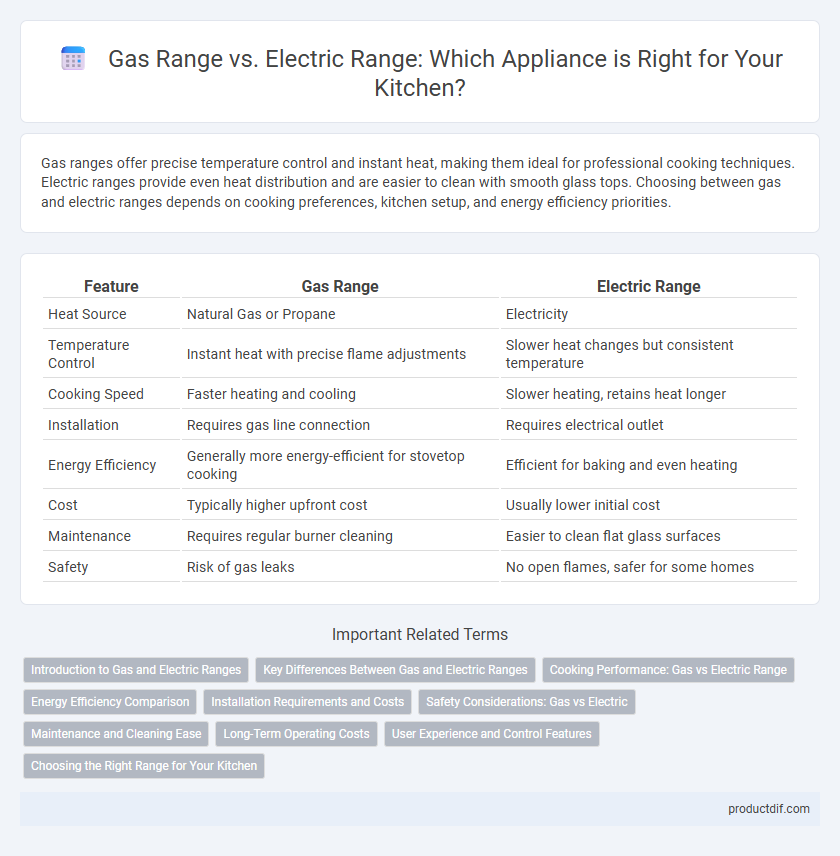Gas ranges offer precise temperature control and instant heat, making them ideal for professional cooking techniques. Electric ranges provide even heat distribution and are easier to clean with smooth glass tops. Choosing between gas and electric ranges depends on cooking preferences, kitchen setup, and energy efficiency priorities.
Table of Comparison
| Feature | Gas Range | Electric Range |
|---|---|---|
| Heat Source | Natural Gas or Propane | Electricity |
| Temperature Control | Instant heat with precise flame adjustments | Slower heat changes but consistent temperature |
| Cooking Speed | Faster heating and cooling | Slower heating, retains heat longer |
| Installation | Requires gas line connection | Requires electrical outlet |
| Energy Efficiency | Generally more energy-efficient for stovetop cooking | Efficient for baking and even heating |
| Cost | Typically higher upfront cost | Usually lower initial cost |
| Maintenance | Requires regular burner cleaning | Easier to clean flat glass surfaces |
| Safety | Risk of gas leaks | No open flames, safer for some homes |
Introduction to Gas and Electric Ranges
Gas ranges offer precise temperature control and instant heat, making them popular for culinary professionals and home cooks alike. Electric ranges provide consistent, even heating with features such as smooth glass cooktops and easy cleaning surfaces. Both appliances vary in installation requirements and energy efficiency, influencing user preferences and kitchen design.
Key Differences Between Gas and Electric Ranges
Gas ranges offer precise temperature control and instant heat, making them ideal for professional chefs and cooking enthusiasts who prioritize responsiveness. Electric ranges provide even heat distribution and a smoother surface, which simplifies cleaning and maintains consistent cooking temperatures. Energy efficiency varies; gas ranges generally cost less to operate due to lower fuel prices, while electric ranges benefit from safer indoor air quality by avoiding combustion emissions.
Cooking Performance: Gas vs Electric Range
Gas ranges offer precise temperature control with immediate flame adjustments, ideal for tasks requiring quick changes in heat. Electric ranges provide consistent and even heating, which benefits slow cooking and baking by maintaining steady temperatures. The choice between gas and electric ranges depends on the cooking style, with gas excelling in responsiveness and electric in temperature stability.
Energy Efficiency Comparison
Gas ranges typically offer faster heat control and lower operating costs due to cheaper fuel prices, but electric ranges convert energy to heat more efficiently, resulting in less overall energy waste. Electric ranges, especially induction cooktops, provide precise temperature control and higher energy efficiency rates of around 84%, compared to gas ranges' efficiency of roughly 40%. Choosing between gas and electric ranges depends on balancing immediate fuel savings with long-term energy efficiency and environmental impact.
Installation Requirements and Costs
Gas range installation requires a natural gas line connection, proper ventilation, and often professional gas fitting services, which can significantly increase initial costs. Electric ranges necessitate a dedicated 240-volt electrical outlet and may require upgrading home wiring, adding to installation expenses. Overall, gas range setups tend to involve higher installation complexity and potential permits, whereas electric ranges offer simpler installation but potentially higher electrical infrastructure costs.
Safety Considerations: Gas vs Electric
Gas ranges present potential risks such as gas leaks and open flames, requiring proper ventilation and regular maintenance to ensure safety. Electric ranges eliminate flame hazards and provide more precise temperature control, reducing the risk of accidental burns and fires. Both types demand diligent usage and awareness, but electric models generally offer enhanced safety for households prioritizing risk minimization.
Maintenance and Cleaning Ease
Gas ranges require regular burner and drip pan cleaning to prevent clogs and ensure consistent flame performance, often involving removable parts for thorough maintenance. Electric ranges feature smooth, flat cooktops with fewer crevices, making surface cleaning easier and quicker but may require periodic coil or heating element checks. Both types demand routine care, yet electric ranges generally offer simpler cleaning procedures due to their design and lack of open flames.
Long-Term Operating Costs
Gas ranges generally have lower long-term operating costs compared to electric ranges due to the lower price of natural gas versus electricity in many regions. Efficiency factors also impact expenses, as gas ranges heat instantly and offer precise temperature control, potentially reducing cooking times and energy waste. However, electric ranges with induction technology can provide competitive energy efficiency, which may affect overall operating expenses depending on usage patterns and local utility rates.
User Experience and Control Features
Gas ranges offer precise temperature control and immediate heat adjustments, enhancing cooking accuracy and responsiveness for experienced users. Electric ranges provide a smooth, flat surface that simplifies cleaning and offers consistent heat distribution, ideal for simmering and slow cooking. User experience often favors gas for its tactile feedback and electric for its safety features and even cooking performance.
Choosing the Right Range for Your Kitchen
Choosing the right range for your kitchen depends on cooking preferences, energy efficiency, and installation requirements. Gas ranges offer precise temperature control and instant heat, making them ideal for professional-style cooking, whereas electric ranges provide even heat distribution and are typically easier to clean. Consider factors such as fuel availability, kitchen ventilation, and maintenance needs to determine the best fit for your culinary habits and home setup.
Gas Range vs Electric Range Infographic

 productdif.com
productdif.com